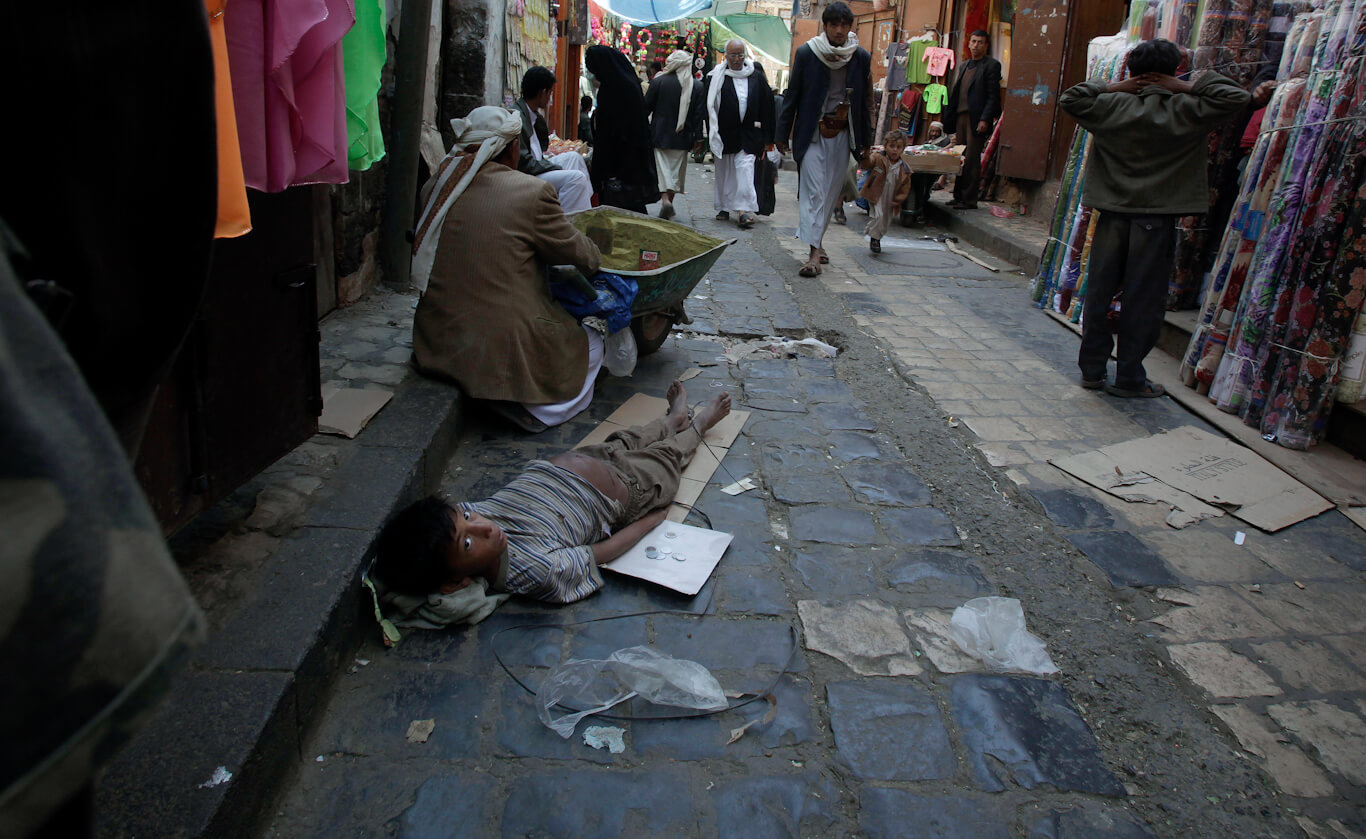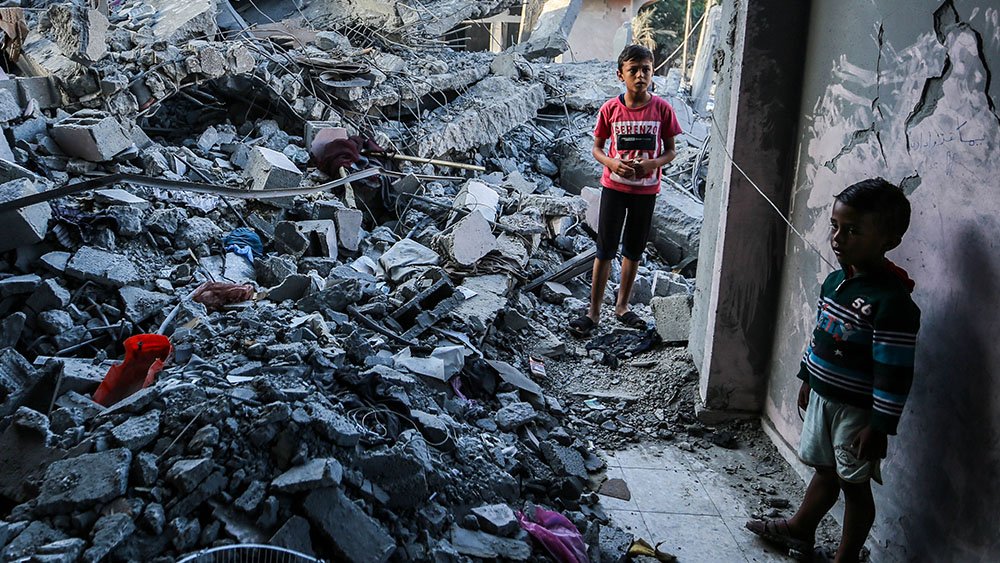Human Trafficking is Booming in Yemen as the War Enters its Fifth Year
from MintPress News:
 A complete absence of law and order in Yemen has given rise to a black Suq (market) of human trafficking on a scale never before seen in the war-torn and war-weary nation.
A complete absence of law and order in Yemen has given rise to a black Suq (market) of human trafficking on a scale never before seen in the war-torn and war-weary nation.
AMRAN, YEMEN — The offensive war on Yemen, the most impoverished nation in the Middle East, was launched in 2015 by a U.S.-backed coalition of Arab countries led by Saudi Arabia, the richest nation in the Middle East. It has plunged a nation already struggling to provide basic services to its citizens into chaos, a nation now ruled by a ragtag consortium of different groups all thirsting for power. The result? A complete absence of law and order that has given rise to a black Suq (market) of human trafficking on a scale never before seen in Yemen.
Thirty-five-year-old Tawfiq hails from Amran, a small city in west-central Yemen famous for its ancient mud-brick high-rises dating back two millennia to the Sabean kingdom. Tawfiq was among 17 Yemeni victims of human trafficking who agreed to speak to MintPress about their harrowing ordeals. In 2016, Tawfiq — desperate to bring money home to his family, as the then-fledgling war decimated the already shaky Yemeni economy — was told by a friend that he could earn as much as $7,000 for one of his kidneys. Days later Tawfiq was on a bus to Saudi Arabia, traveling through al-Wadeeah port on the Yemen-Saudi border.
Today, Tawfiq suffers from complications arising from his kidney extraction and is now unable to carry heavy objects. He told MintPress, “I thought that removing a kidney would be a simple arrangement, but now I live in a hell of pain and suffering.” Tawfiq’s operation was crude and involved no follow-up care.
Ismail, the owner of a small electronics store in Taiz, told MintPress, as he pointed to the place where one of his kidneys use to reside, “I needed money to feed my children.” Ismail hesitated while he recounted his story, worried that the shame of what he had done would reach his family. Yet thousands of Yemeni civilians who are living in abject poverty as a result of the ongoing war are willing to allow a part of themselves to be cut out and sold in order to be able to sustain their families.
Ali al-Jailai, head of the Yemen Organisation for Combating Human Trafficking, told MintPress that the wave of famine that hit the country in 2015, when the Saudi-led war began, has augmented Yemen’s human trafficking network and left women and children the most vulnerable.
“A while back there was a case of a man who was traveling to Egypt to sell his kidney,” al-Jailai told MintPress. “We talked to him and tried to persuade him not to go, but he refused; he needed the money.” With an economy now decimated by more than four years of war, many working-class Yemenis have abandoned hopes of working a normal job and instead turn to one of the few options that remain: to sign up for the fight against Saudi Arabia and the UAE, or to sell their organs to survive.
Over 20 million Yemenis are currently in need of humanitarian assistance, according to the United Nations. Salaries for teachers and other public-sector workers have not been paid regularly since the war began and Saudi Arabia seized control of Yemen’s Central Bank, leaving vulnerable populations at increased risk of falling victim to human trafficking.

A Yemeni boy looks back while laying on the ground as he begs for money in an alley of the old city of Sanaa, Yemen. Muhammed Muheisen | AP
The Yemen Organisation for Combating Human Trafficking, a Sana’a-based NGO, has documented over 10,000 cases of organ sales from the start of the war in March 2015 to 2017. According to the organization, actual figures could be much higher, as many cases go unreported owing to the illegality of the practice, religious concerns, and the associated stigma of the practice in Yemen’s conservative society.
Although he lost one of his kidneys, Tawfiq was lucky. Hundreds of Yemenis, including women and children, forced to “donate” their organs, lose their lives after their livers, kidneys, spleens, corneas, or even their hearts are removed. One Yemeni family recounted to MintPress, on condition of anonymity due to the sensitivity of the case, how they found their son after he went missing: “After his abduction we found his body thrown in the street, you could see there had been an operation on his body; we asked for an autopsy and were in shock after we found his heart was gone.”
Blockading a way out
In addition to poverty and the absence of law enforcement, there are other reasons why human trafficking flourishes in Yemen, perhaps the most prominent being the blockade levied against the country by the Saudi Coalition since 2015. Before the war, Yemenis would regularly leave the country to seek better health care, employment opportunities and safety abroad — including, somewhat ironically, in neighboring Saudi Arabia. Now — with seaports, airports, highways and especially the once-bustling Sana`a International Airport effectively shuttered by the Saudi Coalition — Yemenis are no longer able to flee the violence in their country or travel to neighboring wealthy Gulf countries for stints of work to earn some cash, leaving many with few options but to resort to selling their organs out of desperation to make ends meet.
The blockade has also left a large number of Yemenis stranded abroad, including some students and others who have managed to find a way out in hopes of receiving medical treatment. It is estimated, according to data provided by the Sana`a International Airport Media Center, that nearly 4 million Yemenis are currently stranded abroad. Many of the stranded are left in a state of legal limbo, unable to secure citizenship in neighboring countries and therefore unable to work, leaving them with no way to earn money short of begging on the street or agreeing to sell their organs
Loading...



